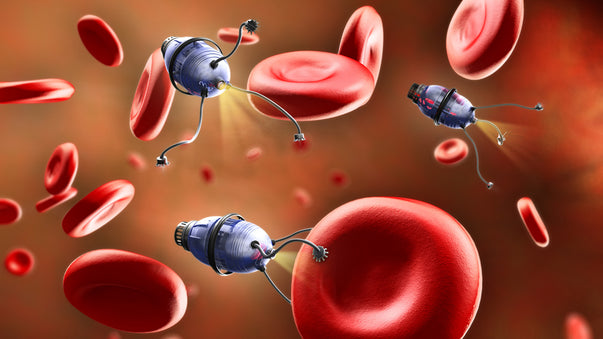Neuron-Like Nanotech for Brain-Like Computers

Brain-inspired or “neuromorphic” computers could be much more efficient than current digital technologies for a wide range of applications. Now, scientists have developed nanomachines that act almost identically to brain cells (see below). These nanomachines could open the door to powerful brain-like computing.
“This is the first study where we have been able to emulate a neuron with just a single nanoscale device, which would otherwise need hundreds of transistors,” said lead researcher Stanley Williams, as reported in a press release issued by Texas A&M University. “We have also been able to successfully use networks of our artificial neurons to solve toy versions of a real-world problem that is computationally intense even for the most sophisticated digital technologies.”
We can leverage neuroscience “for solving problems that the brain is exceptionally good at,” added Williams. “We have demonstrated that depending on the type of problem, there are different and more efficient ways of doing computations other than the conventional methods using digital computers with transistors.”
Nanomachines Emulate brain Cells
Scientists at Texas A&M University, Hewlett Packard Labs, and Stanford University, have developed a nanoscale device that acts almost identically to a brain cell (neuron). The synthetic nanoscale device, or synthetic brain cell, consists of layers of different inorganic materials.
A research paper is published in Nature. It shows that these synthetic brain cells can be joined together to form intricate networks that can then solve problems in a brain-like manner. For example, these brain-like networks can identify possible mutations in a virus.
Molecular Blocks for Rebuilding Antibiotics
Researchers at UC San Francisco have re-designed and re-engineered existing antibiotic molecules to overcome antibiotic resistance. Antibiotic resistance is one of the world's most urgent public health threats.
A paper is published in Nature. It describes a set of molecular LEGO-like pieces that can be altered and joined together to form larger molecules.
Using these molecular building blocks, the researchers have created what they hope is the first of many "rebuilds" of drugs that had been shelved due to antibiotic resistance.
Artificial Cells for Next-Generation Smart Drugs
Chemists at University of Alberta and University of Trento have developed artificial cells that can communicate with other cells within the body. They have potential applications in the field of smart pharmaceuticals.
The artificial cells are described in a study published in Science Advances. They work by detecting changes in their environment within the body. In response, the artificial cells create and release proteins that influence the behavior of other cells within the body.
The new artificial cells are the first that can chemically communicate with and influence the behavior of natural living cells. The chemists are hopeful that, in future smart pharmaceuticals, artificial cells could be engineered to synthesize and deliver specific therapeutic molecules inside the body.
CRISPR-Based Field Test for Malaria
Scientists led by Wyss Institute for Biologically Inspired Engineering and MIT have created a malaria test. This field-applicable, ultrasensitive testing method for both symptomatic and asymptomatic malaria has been developed using cut and paste CRISPR DNA editing technology.
The new malaria diagnostic method is described in a research paper published in PNAS. It combines an optimized 10-minute rapid sample preparation protocol with the CRISPR-based SHERLOCK system. Together, they enable highly specific and sensitive detection of malaria within about an hour.
More Articles
Don't miss a beat! In our Pulse Newsletter, Thrivous curates the most important news on health science and human enhancement, so you can stay informed without wasting time on hype and trivia. It's part of the free Thrivous newsletter. Subscribe now to receive email about human enhancement, nootropics, and geroprotectors, as well as company news and deals.
Read more articles at Thrivous, the human enhancement company. You can browse recent articles in Thrivous Views. See other Pulse Newsletter articles. Or check out an article below.
-
Medical Nanotech with Semiconductors
Scientists led by Cornell University have created tiny micro-robots, invisible to the naked eye. They walk using four legs controlled ...
-
New Drug Treats COVID-19 in Mice and Hamsters
A new drug, called "Ab8," shows promise in the fight against COVID-19 (see below). The tiny size of the molecules ...


